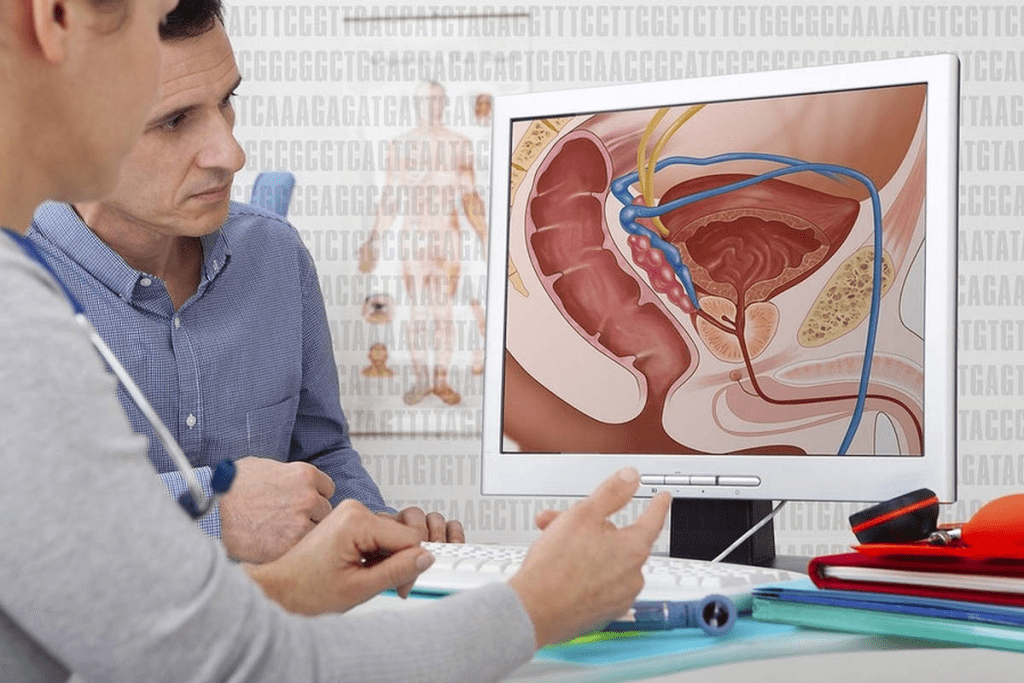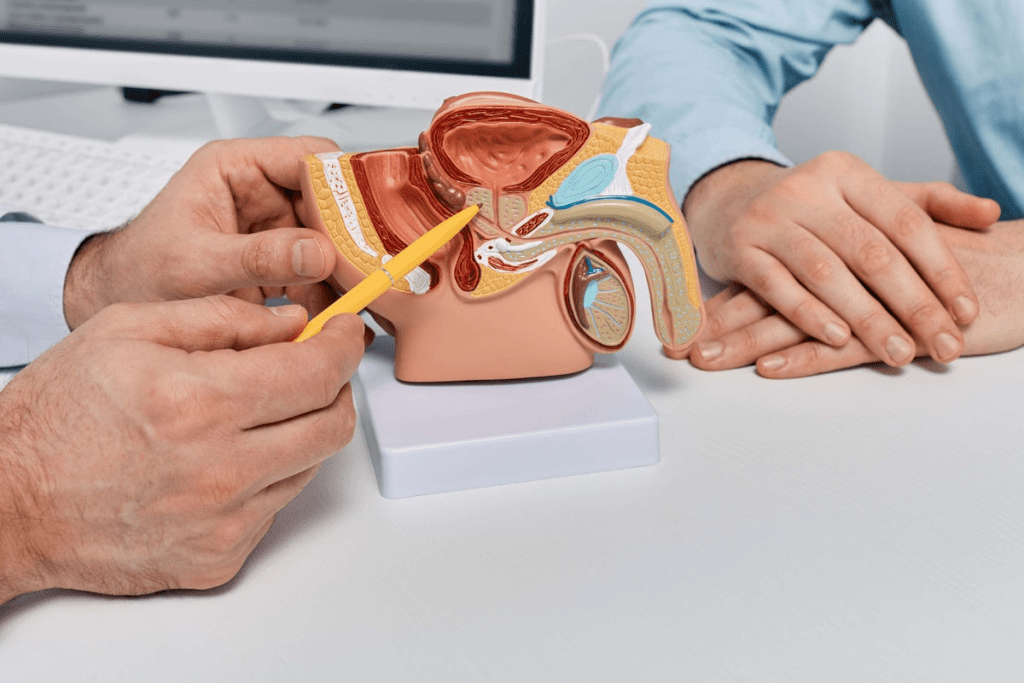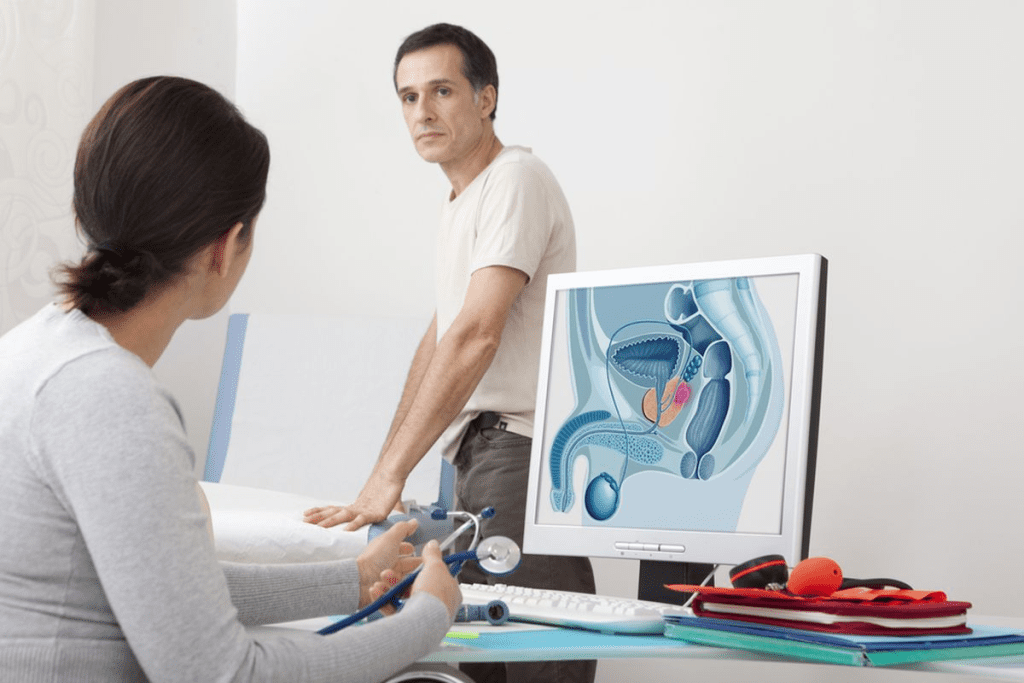Last Updated on October 31, 2025 by
Men who have had prostate surgery need to know how their daily habits affect their recovery.
Caffeine is a big part of many people’s mornings. But its effect on prostate health is a topic of debate. Studies show that caffeine’s impact on prostate cancer outcomes depends on the person.

Some studies suggest that people who quickly process caffeine might see benefits. But, others might face risks, like a higher chance of Benign Prostatic Hyperplasia (BPH).
Before prostate surgery, it’s key to know the basics of the operation and recovery. Prostate surgery treats issues like cancer by removing the gland and nearby tissue. The recovery can differ based on the surgery type.
There are many prostate surgeries, each for different reasons. A radical prostatectomy removes the gland, seminal vesicles, and tissue. It’s often for cancer. Other surgeries help with enlarged prostate symptoms or other issues.
The right surgery depends on health, cancer stage, and urinary and sexual function. Talking to a doctor about these factors is important for choosing the best option.
Recovery from prostate surgery takes weeks, with symptoms like incontinence and erectile dysfunction. Most return to normal in 6 to 8 weeks. But, full recovery can take longer.

After surgery, patients get specific recovery instructions. These include activity limits, diet changes, and follow-up visits. Following these helps avoid complications and speeds up recovery.
Eating right is key after prostate surgery. A diet full of fruits, veggies, and whole grains supports healing. Drinking plenty of water is also important, but caffeine and alcohol may need to be limited.
Talking to a doctor or nutritionist about diet is a good idea. They can help ensure you get the nutrients you need for a smooth recovery.
Men recovering from prostate surgery should think about caffeine’s impact on their urinary system. Caffeine is in many drinks and foods. It affects the body in many ways.
Caffeine can irritate the bladder and make urinary symptoms worse. Research shows it can increase how often you need to pee and how urgent it is. We’ll look at the evidence and how to manage caffeine to reduce its effects.
The urinary system is sensitive after prostate surgery. Caffeine’s diuretic effect can make this worse. It’s important for men to know how their body reacts to caffeine and adjust their intake.

Caffeine’s effect on inflammation is complex. Some studies suggest it may have anti-inflammatory properties, which could be good for health. But its impact on inflammation after prostate surgery needs more study.
People metabolize caffeine differently, affecting their urinary system and prostate health. Genetic factors are key in caffeine metabolism. Understanding these variations is important for personalized advice on caffeine after prostate surgery.
Age, smoking, and health also affect caffeine metabolism. We’ll talk about how these factors influence caffeine’s effects. We’ll also give tips on making informed decisions about caffeine during recovery.
Recent studies have looked into how caffeine affects prostate health after surgery. It’s important to understand how caffeine impacts recovery after prostate surgery.
Research on caffeine and prostate cancer survival has shown mixed results. Some studies say caffeine intake may not significantly affect prostate cancer survival rates. But other research shows that individuals who metabolize caffeine quickly might have different outcomes than those who metabolize it slowly.
A study found that fast metabolizers of caffeine might have a slightly better prognosis. This could be because caffeine affects certain biochemical pathways related to cancer cell growth.
Studies have looked into caffeine’s effect on BPH, an enlarged prostate condition. Some research suggests that high caffeine intake may be associated with an increased risk of developing BPH. But the evidence is not clear, and more research is needed.
It’s important to remember that moderation is key when it comes to caffeine, even after prostate surgery. Watching how caffeine affects urinary symptoms can help understand its impact on health.
Not all caffeine sources are the same. Coffee, tea, and energy drinks have different levels of caffeine and compounds that may affect prostate health. For example, coffee has antioxidants that could be good for overall health.
Research shows that the type of caffeine source can affect its impact on the body. Coffee drinkers might experience different effects than those who drink caffeinated energy drinks or tea.
Considering the research, it’s clear that individual responses to caffeine can vary significantly. Men recovering from prostate surgery should be mindful of their caffeine intake. They should also talk to their healthcare provider for personalized advice.
Recovering from prostate surgery is complex. It depends on lifestyle and health before surgery. Knowing how different things affect healing is key.
Smoking affects recovery from prostate surgery a lot. Smokers heal slower and face more risks. Caffeine can also play a role, affecting blood flow and how the body reacts to surgery.
We suggest avoiding smoking and talking to doctors about caffeine. This helps manage any bad effects.
Age is very important for recovery. Older people heal more slowly because of their metabolism. Metabolic health is key in post-surgery care.
We tell patients to work with their doctors. This way, they can plan recovery based on age and metabolism.
Urinary symptoms before surgery can affect recovery. Patients with BPH need to watch their symptoms closely. Caffeine can make symptoms worse.
It’s important to keep an eye on caffeine intake. Adjust it based on how the body reacts.
Understanding these factors helps patients recover better. A personalized recovery plan is essential. It should consider health, lifestyle, and substance interactions.
Knowing how to manage caffeine is key for those recovering from prostate surgery. Caffeine can help or harm during this time. Here are five tips for using caffeine wisely during recovery.
Right after surgery, it’s best to cut down or stop caffeine. It can make you urinate more, which might bother your bladder and slow healing. Stick to water and drinks with electrolytes during this time.
When you’re a bit further along, you can slowly add caffeine back into your diet. Watch how your body reacts, looking out for any discomfort or bladder problems. Start with a little to see how you do.
After six weeks, your body has healed a lot. But keep an eye on your caffeine use. Some research says a bit of caffeine is okay for the prostate.
“Moderate caffeine consumption is generally safe for most men, but individual tolerance can vary greatly.”
If you want to cut down on caffeine, there are other choices. Try herbal teas, decaf coffee, or flavored water. These can be good substitutes.
By following these tips, you can make smart choices about caffeine during recovery. It’s wise to talk to your doctor for advice that fits your needs.
After prostate surgery, it’s key to know when to talk to your doctor about caffeine. Your body is healing, and caffeine can affect your urinary system and health.
If you notice these symptoms after drinking caffeine, see your doctor:
These signs might mean caffeine is harming your urinary system. Your doctor can help manage these issues.
When talking to your urologist about caffeine, ask these questions:
Your urologist can give advice tailored to your situation and recovery.
To see how caffeine affects you, keep a log of your intake and symptoms. This helps you spot patterns and issues, making it easier to talk to your doctor.
Tips for tracking:
Being proactive and informed helps you work with your healthcare team. This way, you can improve your recovery and avoid complications.
Diet plays a big role in healing after prostate surgery. This includes what we drink, like caffeine. We’ve seen that caffeine’s effects can vary from person to person.
When thinking about eating right after prostate surgery, we must weigh caffeine’s good and bad sides. A good diet can really help your health get better. Always talk to your doctor about how much caffeine is safe for you.
Knowing how to recover from prostate surgery means making smart choices. This includes what you drink. By choosing wisely, you can help your body heal faster and better.
The safety of caffeinated drinks after prostate surgery varies. It depends on the surgery type, your health, and your doctor’s advice. Always check with your urologist for the best advice.
Caffeine might make you urinate more often. This could affect your bladder control after surgery. But, how you react to caffeine can differ a lot.
It’s wise to avoid caffeinated drinks, spicy foods, and acidic drinks while recovering. They might irritate your bladder and urethra. Your doctor can give you specific dietary advice.
Caffeine can affect your recovery in several ways. It might impact your bladder, cause inflammation, and affect your health. But how much it affects you depends on many factors.
When to start drinking caffeinated drinks again varies. It depends on your recovery and your doctor’s instructions. It’s best to start slowly and watch for any bad effects.
Yes, you can try herbal teas, decaf coffee, and water. These can help with hydration and reduce caffeine intake during recovery.
Smoking can harm your recovery from prostate surgery. It can affect wound healing and urinary function. Caffeine and smoking both impact your heart health and recovery.
Ask your urologist about caffeine safety during recovery. Find out how to watch for caffeine issues and any guidelines for adding caffeinated drinks back into your diet.
Use a symptom journal to track caffeine’s effects. Note your caffeine intake, urinary symptoms, and other health info. This helps you and your doctor understand any patterns or issues.
Subscribe to our e-newsletter to stay informed about the latest innovations in the world of health and exclusive offers!